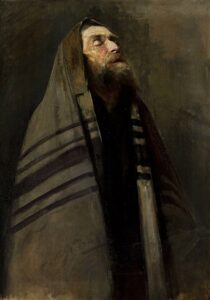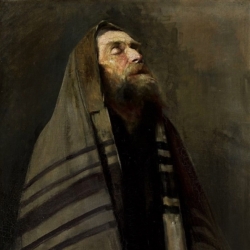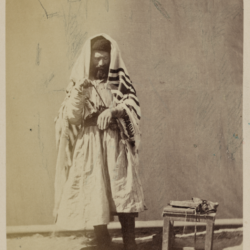In Jewish liturgy, some passages are dəvarim she-bi-qdusha, passages that require public communal prayer. Most famous among these are the Qaddish, Barkhu, and Qədusha. But people are not always able to pray in a community! In liturgical history both ancient and modern many different tashlumim (replacements) for these texts when praying individually have been suggested. The following is a replacement for the Barkhu of Shaḥarit that used to be found in many traditional Ashkenazi siddurim.
While Isaac Seligman Baer’s Seder Avodat Yisrael was used as a source, these specific replacements are also found in works as varied as the Kitsur SheLaH and the siddur of the Yaavets. (This is exceptionally ironic since the known heresy-hunter was the one who proved the Kitsur SheLaH was a Sabbatean work!) Many of the texts found here are in variant form, often a form not found elsewhere in manuscripts.
| Source (Hebrew) | Translation (English) |
|---|---|
מי שאינו יכול להתפלל עם הציבור או שאיחר לבוא לביה״כ ולא שמע קדיש או ברכו או קדושה הוא ישלים חסרונו בפסוקים וברייתות המדברות מענינים אלו, וע״פ הנוסחאות הנאות. |
One who cannot pray with the community or who is late in coming to synagogue and did not hear the Qaddish, Barkhu, or Qədushah, can make up his absence with verses and tannaitic teachings that speak of these matters, and according to the appropriate nusḥaot. |
מי שלא שמע ברכו של שחרית יאמר זה אחר תחנון׃ |
One who did not hear the Barkhu of Shaḥarit says this after Taḥanun: |
זֶה אוֹמֵר אֲנִי בִּמְקוֹם בָּרֲכוּ שֶׁל־שַׁחֲרִית׃ |
This I am saying in place of the Barkhu of Shaḥarit! |
בִּפְרֹ֤עַ פְּרָעוֹת֙ בְּיִשְׂרָאֵ֔ל בְּהִתְנַדֵּ֖ב עָ֑ם בָּֽרְכ֖וּ יְהֹוָֽה׃ (שופטים ה:ב) בָּרְכוּ֙ אֶת־יְהֹוָ֣ה אֱלֹֽהֵיכֶ֔ם מִן־הָעוֹלָ֖ם עַד־הָעוֹלָ֑ם וִיבָֽרְכוּ֙ שֵׁ֣ם כְּבֹדֶ֔ךָ וּמְרוֹמַ֥ם עַל־כׇּל־בְּרָכָ֖ה וּתְהִלָּֽה׃ (נחמיה ט:ה) |
When rebukes are rebuked in Israel, when the people volunteers, bless the Cause! (Judges 5:2) Bless the Cause your God from eternity to eternity, and they will bless Your glorious Name, exalted over every blessing and praise! (Nehemiah 9:5) |
יְהִ֤י שֵׁ֣ם יְהֹוָ֣ה מְבֹרָ֑ךְ מֵ֝עַתָּ֗ה וְעַד־עוֹלָֽם׃ (תהלים קיג:ב) |
May the Cause’s name be blessed from now until forever! (Psalms 113:2) |
בָּר֤וּךְ ׀ יְהֹוָ֣ה אֱ֭לֹהִים אֱלֹהֵ֣י יִשְׂרָאֵ֑ל עֹשֵׂ֖ה נִפְלָא֣וֹת לְבַדּֽוֹ׃ וּבָר֤וּךְ ׀ שֵׁ֥ם כְּבוֹד֗וֹ לְע֫וֹלָ֥ם וְיִמָּלֵ֣א כְ֭בוֹדוֹ אֶת־כֹּ֥ל הָאָ֗רֶץ אָ֘מֵ֥ן ׀ וְאָמֵֽן׃ (תהלים עב:יח-יט) |
Blessed be the Cause, God, God of Israel, who does wonders alone. And blessed be Their glorious Name, forever, and may Their glory fill all the earth, amen and amen! (Psalms 72:18-19) |
אָמַר רַבִּי עֲקִיבָה בְּכׇל־יוֹם וָיוֹם מַלְאָךְ אֶחָד עוֹמֵד בְּאֶמְצַע הָרָקִיעַ שַׁחֲרִית וְאוֹמֵר יְהֹוָה מֶלֶךְ יְהֹוָה מָלַךְ יְהֹוָה יִמְלֹךְ לְעֹלָם וָעֶד וְכׇל־גְּדוּדֵי מַעְלָה עוֹנִים אַחֲרָיו עַד־שֶׁמַּגִּיעַ לְבָרֲכוּ. כְּשֶׁמַּגִּיעַ לְבָרֲכוֹ חַיָּה אַחַת שֶׁשְּׁמָהּ יִשְׂרָאֵל וְחָקוּק עַל־מִצְחָהּ יִשְׂרָאֵל עוֹמֶדֶת בְּאֶמְצַע הָרָקִיעַ וְאוֹמֶרֶת בְּקוֹל רָם בָּרֲכוּ אֶת־יְהֹוָה הַמְּבֹרָךְ וְכׇל־גְּדוּדֵי מַעְלָה עוֹנִים בָּרוּךְ יְהֹוָה הַמְּבֹרָךְ לְעוֹלָם וָעֶד׃ (הכלות רבתי לא:ד) |
Rabbi Aqiva said: “each and every day a single messenger-angel stands in the midst of the firmament in the morning and says ‘The Cause is sovereign! The Cause reigned! The Cause will reign forever and aye!’ and all the highest hosts respond after him until he reaches Barkhu. And when he reaches Barkhu, a single beast-angel whose name is Israel and on whose forehead is engraved ‘Israel’ stands in the midst of the firmament and says aloud, ‘Bless the blessings-worthy Cause!’ and all the highest hosts respond ‘Bless the blessings-worthy Cause forever and aye!’” (Hekhalot Rabbati 31:4) |
Source(s)


“תשלומי שחרית ברכו ליחיד (אשכנז) | Replacement for the Barkhu of Shaḥarit when Praying Alone or Without a Minyan, from Seder Avodat Yisrael (1868)” is shared through the Open Siddur Project with a Creative Commons Attribution-ShareAlike 4.0 International copyleft license.





Leave a Reply